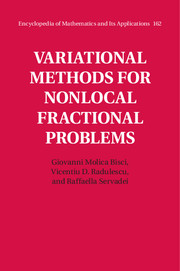Book contents
- Frontmatter
- Dedication
- Contents
- Foreword
- Preface
- Part I Fractional Sobolev spaces
- Part II Nonlocal subcritical problems
- Part III Nonlocal critical problems
- 14 The Brezis–Nirenberg result for the fractional Laplacian
- 15 Generalization of the Brezis–Nirenberg result
- 16 The Brezis–Nirenberg result in low dimension
- 17 The critical equation in the resonant case
- 18 The Brezis–Nirenberg result for a general nonlocal equation
- 19 Existence of multiple solutions
- 20 Nonlocal critical equations with concave-convex nonlinearities
- Bibliography
- Index
17 - The critical equation in the resonant case
from Part III - Nonlocal critical problems
Published online by Cambridge University Press: 05 March 2016
- Frontmatter
- Dedication
- Contents
- Foreword
- Preface
- Part I Fractional Sobolev spaces
- Part II Nonlocal subcritical problems
- Part III Nonlocal critical problems
- 14 The Brezis–Nirenberg result for the fractional Laplacian
- 15 Generalization of the Brezis–Nirenberg result
- 16 The Brezis–Nirenberg result in low dimension
- 17 The critical equation in the resonant case
- 18 The Brezis–Nirenberg result for a general nonlocal equation
- 19 Existence of multiple solutions
- 20 Nonlocal critical equations with concave-convex nonlinearities
- Bibliography
- Index
Summary
In previous chapters we proved that the famous result by Brezis and Nirenberg (see [46, 60, 114, 221]) for the Laplace equation continues to hold in the nonlocal setting of (14.2), provided that λ is not an eigenvalue of (− Δ)s. With respect to the classical Brezis–Nirenberg result, the resonant case in dimensions different from 4s remains open, that is, the case where n ≠ 4s and λ is an eigenvalue of the operator (−Δ)s with homogeneous Dirichlet boundary data.
The aim of this chapter is to consider (14.2) in this setting because we thought that it would be interesting to check what happens in this case to verify whether the classical result known for the Laplacian can be extended to the nonlocal fractional framework. In this way, the study of the critical fractional Laplace problem (14.2) is completed. This chapter is based on the paper [197].
Main results
The main result of this chapter is the following:
Theorem 17.1Let s ∈ (0, 1), n > 2s, and Ω be an open, bounded subset of Rn with continuous boundary. Moreover, let λ be an eigenvalue of (−Δ)s with homogeneous Dirichlet boundary data. Then problem (14.2) admits a nontrivial weak solution u ∈ ℍ0s (Ω), provided that either
• n > 4s or
• 2s < n < 4s and λ is sufficiently large.
As a consequence of Theorem 17.1 and Theorems 14.1, 15.1 and 16.1, we get the following existence result, which extends completely to the nonlocal fractional framework the well-known Brezis–Nirenberg-type results given in [46, 60, 114, 221] for the Laplace equation:
Theorem 17.2Let s ∈ (0, 1), n > 2s, and Ω be an open, bounded subset of ℝn with continuous boundary. Then problem (14.2) admits a nontrivial weak solution u ∈ ℍ0s (Ω), provided that either
• n > 4s and λ >0,
• n = 4s and λ >0 is different from the eigenvalues of (−Δ)s, or
• n < 4s and λ >0 is sufficiently large.
Roughly speaking, Theorem 17.2 says that what happens in the nonlocal framework is exactly what we know in the classing setting (see [46, 60, 114, 221] and also [120, 212, 220] and references therein).
- Type
- Chapter
- Information
- Variational Methods for Nonlocal Fractional Problems , pp. 299 - 308Publisher: Cambridge University PressPrint publication year: 2016

